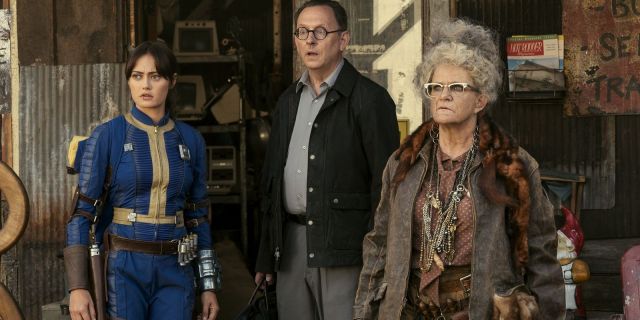The Fallout show established its characters in the first episode. The naive vault dweller, unfulfilled Brotherhood soldier, and amoral bounty hunter set out on various quests. Their paths cross in “The Target,” laying several conflicting motivations across each other in a thrilling set piece. This episode also features several fun monsters to give the series some horrific moments. It’s a strong statement of purpose and an improvement over the debut.
Geneva Robertson-Dworet co-wrote Fallout‘s first three episodes. The screenwriter reached prominence with her script for the 2018 Tomb Raider movie, establishing her bona fides in video game adaptations. She also co-wrote Captain Marvel with six other professionals. Her creative voice lends the outlandish circumstances a human element, but her contributions to the show’s sense of humor remain a mixed bag.
“The Target” follows its three protagonists as they hunt down their charges for various reasons. The episode opens with the introduction of a fan-favorite character, Dogmeat. The fateful German Shepherd grows up in a lab under the watchful eye of a questionable scientist named Siggi Wilzig (Michael Emerson.) Wilzig’s vague experiments earn the ire of his fellow doctors, who pull an alarm and have him sent away. The episode leaps ahead to find Lucy wandering the wasteland. She encounters Wilzig, prompting a chat in which he ominously compares her experience to that of the local radroaches. It’s a fun metaphor that ties in classic nuclear mythology, an iconic enemy from the game, and Lucy’s journey. She sets out for a scrap settlement called Filly, hunting for information surrounding her father’s kidnapper. The locals hate her and her ilk, bringing up some fascinating points about the inherent privilege of life in the vaults. Before they can send her packing, Wilzig returns, bringing trouble with him.

While Lucy struggles to make friends, Maximus finds an enemy. Though initially delighted to become a squire to the power-armored knight, Max finds Titus insufferable. He’s like a surly eleven-year-old boy wearing one of the deadliest weapons in fiction. After the knight demands a chance to kill something, Titus and Max drop into unfamiliar territory to scout for something worthwhile. Max stumbles onto a hint to their target’s direction, but Titus is busy angering a mutated bear. The nightmarish animal thrashes Titus, handily demonstrating the danger the wasteland embodies, even to a trained soldier in power armor. This irradiated ursine poses a challenge for Max, who watches a symbol of his hope for the future try and fail to kill a wild animal. He eventually relents and takes the shot, but Titus makes him regret his decision. Through taunting and threats, Titus convinces Max to abandon his knight, take his armor, and hunt down his target alone. After a messy confrontation with some locals, he steps toward Filly.
The Ghoul plays a more straightforward role in this episode. Rudely awakened by greedy hunters, the former cowboy star takes up their quest to find and kill Wilzig. He hangs out in Filly as Lucy reaches the city. The Ghoul demonstrated his skills in his most recent scene, but a shootout in Filly lets him reach new heights. Action occupies a questionable place in the Fallout show. It shouldn’t be the main draw, but no one could call it Fallout without it. Goggins gets to flex his Western muscles as a cowboy Deadpool. The show unleashes comical gore with a charming sense of glee. It’s a hard balance of tones to nail, but Fallout is in the right place so far.
One of the dangers of making this show is its place between two eras of the Fallout franchise. It can reach toward the first two games, which featured deeper narratives and engaging social commentary. Those are, however, not the games most think of when they picture that iconic lightning bolt logo. Fallout 3 and its successors prioritized action and delivered sloppier stories. Fallout struggles to square that circle with a series of fascinating compromises. Its moral questions have been easy. Its characters remain decent. Its social commentary remains surface-level. However, in a new context, the show stays engaging for fans and newcomers of all kinds. It’s walking a tightrope, and though it sways at times, it’s still up there for now.

Fallout is compelling as a dystopian sci-fi Western. It has a lot going on, delivering an ensemble cast with almost no weak links. Most of its elements excel without becoming particularly unique. Only in harmony, in fine details, and in full appraisals does the show stand in its own right. Fans of the games will be delighted to see the visual beauty of their favorite in-game details in live action, but this show offers much more. “The Target” announces the series’ aptitude for action, comedy, and storytelling. While it isn’t a groundbreaking new experience, Fallout is a fun show worth seeking out. It’s an excellent binge-watch if nothing else.











Leave a Reply